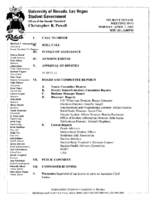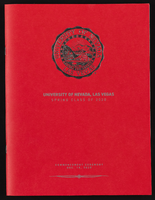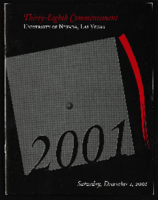Search the Special Collections and Archives Portal
Search Results

Meeting minutes for Consolidated Student Senate, University of Nevada, Las Vegas, April 07, 2003
Date
Archival Collection
Description
Text

Transcript of interview with James Bonnell by Gerald L. Conner, February 22, 1977
Date
Archival Collection
Description
On February 22, 1977, James Bonnell interviewed Gerald L. Connor (born 1930 in Boston, Massachusetts) about his experiences in Nevada and his work in education. Connor first talks about his move to Nevada while he was a member of the United States Air Force. He then discusses his education, including that at the University of Nevada, Las Vegas, and also describes his church membership. Connor later talks about changes in the schools and school district, the growth of gambling and properties located in Downtown Las Vegas and the Las Vegas Strip, and the early atomic tests at the Nevada Test Site. He also describes in detail his political activity and involvement with the Democratic Party, including his work with candidates for the offices of Nevada Governor and United States Senator. Towards the end of the interview, Connor talks about events such as Helldorado, the growth of the city over time, and his thoughts on the future of Las Vegas.
Text

Transcript of interview of Thalia Dondero by Mary Germain, March 13, 1976
Date
Archival Collection
Description
On March 13, 1976, Mary Germain interviewed Thalia Dondero (born 1921 in Greeley, Colorado) about her life in Nevada and her experiences as the first female commissioner for the Clark County Commission. Dondero first talks about her upbringing and her eventual move to Southern Nevada. She also discusses her involvement in extracurricular activities, such as being a leader for the Girl Scouts, and how some of those experiences led her to get involved in politics. Dondero also mentions her work with National Geographic and her passion for working with oil paintings and watercolors. The final part of the interview involves some of Dondero’s accounts as a commissioner for Clark County and some of the challenges she has faced in that position.
Text

Transcript of interview with Russell K. Grater by James M. Greene, November 25, 1974
Date
Archival Collection
Description
On November 25, 1974, collector James M. Greene interviewed Russell K. Grater (born November 16th, 1907 in Lebanon, Indiana) in his home in Boulder City, Nevada. This interview offers an overview of the United States Park Service. Mr. Grater also offers an overview on the history of housing developments in the Las Vegas Valley and Nelson Township. The interview concludes with discussion on the leaf system of local plants.
Text

University of Nevada, Las Vegas (UNLV) Spring 2020 commencement program
Date
Archival Collection
Description
Commencement program from University of Nevada, Las Vegas Commencement Programs and Graduation Lists (UA-00115).
Text

University of Nevada, Las Vegas (UNLV) 38th commencement program
Date
Archival Collection
Description
Commencement program from University of Nevada, Las Vegas Commencement Programs and Graduation Lists (UA-00115).
Text

Interview with Peter Henry Zavattaro, May 31, 2005
Date
Archival Collection
Description
Text

Interview with A. Costandina (Dina) Titus, September 28, 2004
Date
Archival Collection
Description
Text

Interview with John Frederick Campbell, January 31, 2006
Date
Archival Collection
Description
Text

James L. Hogan interview, March 11, 1978: transcript
Date
Archival Collection
Description
On March 11, 1978, collector Patty L. Baratti interviewed James Hogan (born April 6th, 1909 in Winton Place, Ohio) at his home in Las Vegas, Nevada. In this interview, Hogan talks about his time working with the telephone company in Arizona and moving to Las Vegas, Nevada. He discusses his time working on grazing rights and cattle ranching in Nevada and how planning went to ensure that farms were able to have land to graze their animals. He speaks about dealing with farmers, corporations, and the government and the frustrations he had to deal with before there were set laws about grazing. He also discusses the change from mainly family farms in Nevada to corporations owning much of the farmland.
Text
